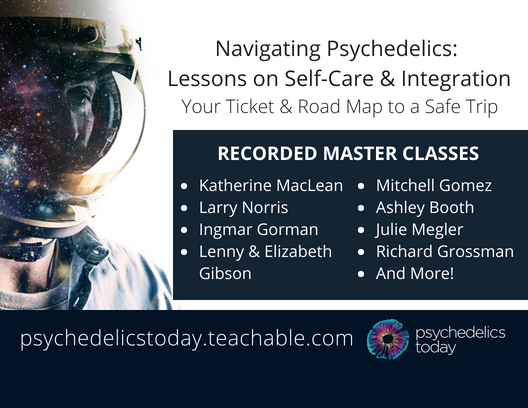In this Episode, Kyle sits down with Elizabeth Nielson and Ingmar Gorman, Co-founders of Fluence, Training in Psychedelic Integration. They are both therapists on the MAPS clinical trial for MDMA Assisted Psychotherapy for PTSD.
3 Key Points:
- Elizabeth and Ingmar are co-founders of Fluence, an online Psychedelic Integration Training program.
- If psychedelic treatments become available more widely, the fear is that therapists won't be as educated on how to handle their patient interactions based on the behavior of each psychedelic. Psychedelic Integration Therapy Training is so important.
- There are 3 phases to the MDMA for PTSD clinical trial. Phase 1 would be pre-clinical data about the chemistry of a drug, Phase 2 is where you begin to test your treatment in a patient population, and Phase 3 is where you get the data to demonstrate that the treatment is superior to a placebo and other treatments in general.
Support the show
- Patreon
- Leave us a review on iTunes
- Share us with your friends – favorite podcast, etc
- Join our Facebook group - Psychedelics Today group – Find the others and create community.
Navigating Psychedelics
Show Notes
About Ingmar
- Ingmar is a previous guest of the show
- He is a private Investigator for the MAPS MDMA trial
- He is a therapist and the Co-founder of Fluence
About Elizabeth
- Elizabeth is a Clinical Psychologist
- She has a long history in working with clinical trials as a therapist
- She is part of the psychedelic education and continuing care program
- She does a lot of supervision and training for therapists
The Trial
- The approval of expanded access by the FDA includes 50 people in total
- They are near the end of MAP 1 (out of MAP 1 and MAP 2)
- When they transition into MAP 2, it will be a little more refined
- MAP 2 is different participants than MAP 1
- There are 3 phases
- Phase 1 would be pre-clinical data about chemistry of a drug and how it metabolises, if its poisonous, etc
- Phase 2 is where you begin to test your treatment in a patient population
- Phase 3 is where you get the data to demonstrate that the treatment is superior to a placebo and other treatments in general
- They are done as a double-blind trial, both the therapist and patient don't know if the patient is receiving the treatment or now
Take-aways
- There is a lot of information that has to be shared effectively
- The therapists are very much in the lives of the participants on top of just the MDMA
- Instead of learning from the trials of what to do on a practical level, its about inspiring them to bring this as an actual treatment for people
- The multiple ways that PTSD can manifest and look like, and the may ways that MDMA can look like when administered, have some commonalities
- The deepening, the broadening, the way they communicate, can all be the same
- Ingmar holds the belief in the inner healing intelligence of all people
- One of the first things he does when he begins with a new patient, he says that this is something he really believes in, and his role as a therapist to help them in their own healing process and mechanism
- What Elizabeth wanted to learn, know and practice while she was going through school, isn't what she she thought it was until she found it
- She says this work really requires them to trust people's minds and experiences
- There is something that they tell their patients, “Don't get ahead of the medicine” - Elizabeth
- There is an interesting paradox between not knowing and following intuition, to having an actual method and following that
- There is a sweet spot between following a script to following your intuition as a therapist
- You want to trust that inner healer process of the patient, but also need to know when to intervene (usually from a safety standpoint)
Fluence
- 3 days after Horizons, Elizabeth was at home with a cold, and talked to Ingmar that morning curious for a name for the project
- Fluence means, magical or mystical power or source of power
- It can also refer to the density of particles of energy
- They teach about harm reduction and integration with their patients in their practice
- They aren't teaching protocols in the workshops, they just think the harm reduction is important
- The last part of integration is mindfulness
- Ingmar’s biggest influence are his clients and patients, he is so inspired by them
- A large piece of the motivation for creating Fluence is from patients just looking for someone to talk about their experience with
The Why
- A mother whose teenage daughter with depression, reached out to Ingmar with trouble trying to treat her depression
- The family decided it would be a good idea to use Ketamine therapy, which was successful
- She was doing so well, so well that she then went to a therapist to integrate it
- The therapist that she went to then instead of responding positively, decided to fire the teen for further therapy, and report the parents to child care services for providing ketamine therapy
- Ingmar says their position is not that everyone needs psychedelic integration therapy, its specifically for those that don't feel supported by family or community, and it gives them a professional service as an option
- "Psychedelics are not 10 years of change in one night, they are 10 years of insight in one night. integration is so important." - Elizabeth
- The goal is to support people in making a change that feels safe and right for them
- If the treatments become available more widely, the fear is that therapists won't be as educated on how to handle their patient interactions based on the behavior of each psychedelic
- Mental health practitioners can be a great source for working through those experiences
Menla Training
- Menla Training
- They could really take their time with the process and training
- The trainings that they had gone to has made their own Fluence courses better
- In 2019 they had 5 of the trainings for clinicians, and the trainings will be better and better as they go
Ketamine Infusion Therapy
- The experience is not dose dependent
- The purpose of the workshop is to educate both therapists and doctors about what can happen in psychotherapy
Links
Psychedelics 101 and 102 Workshop at ICPR 2020
About Elizabeth

Dr. Elizabeth Nielson is a co-founder of Fluence and a psychologist with a focus on developing psychedelic medicines as empirically supported treatments for PTSD, substance use problems, and mood disorders. Dr. Nielson is a therapist on FDA approved clinical trials of psilocybin-assisted treatment of alcohol use disorder, MDMA-assisted treatment PTSD, and psilocybin-assisted treatment of treatment resistant depression. Through Fluence, she provides continuing education and training programs for therapists who wish to engage in integration of psychedelic experiences in clinical settings. Her program of research includes qualitative and mixed-methods projects designed to further understand the phenomenology and mechanisms of change in psychedelic-assisted therapy, including the experiences of trial participants and of the therapists themselves. Having completed an NIH postdoctoral fellowship at NYU, she has published and presented on topics of psychedelic therapist training, therapists’ personal experience with psychedelics, and including psychedelic integration in group and individual psychotherapy.
About Ingmar

Dr. Ingmar Gorman is a co-founder of Fluence and a psychologist who specializes in assisting populations who have a relationship with psychedelics. He is the site co-principal investigator and therapist on a Phase 3 clinical trial studying MDMA-assisted psychotherapy for post-traumatic stress disorder. Dr. Gorman is a board member of Horizons Media, Inc., a not for-profit educational charity and organizer of the Horizons Conference: Perspectives on Psychedelics. After completing his NIH postdoctoral fellowship at New York University, Dr. Gorman stepped down as director of the Psychedelic Education and Continuing Care Program to focus his efforts on Fluence and the training of future therapists.
 Get a 30 day free audible trial at audibletrial.com/psychedelicstoday
Get a 30 day free audible trial at audibletrial.com/psychedelicstoday


